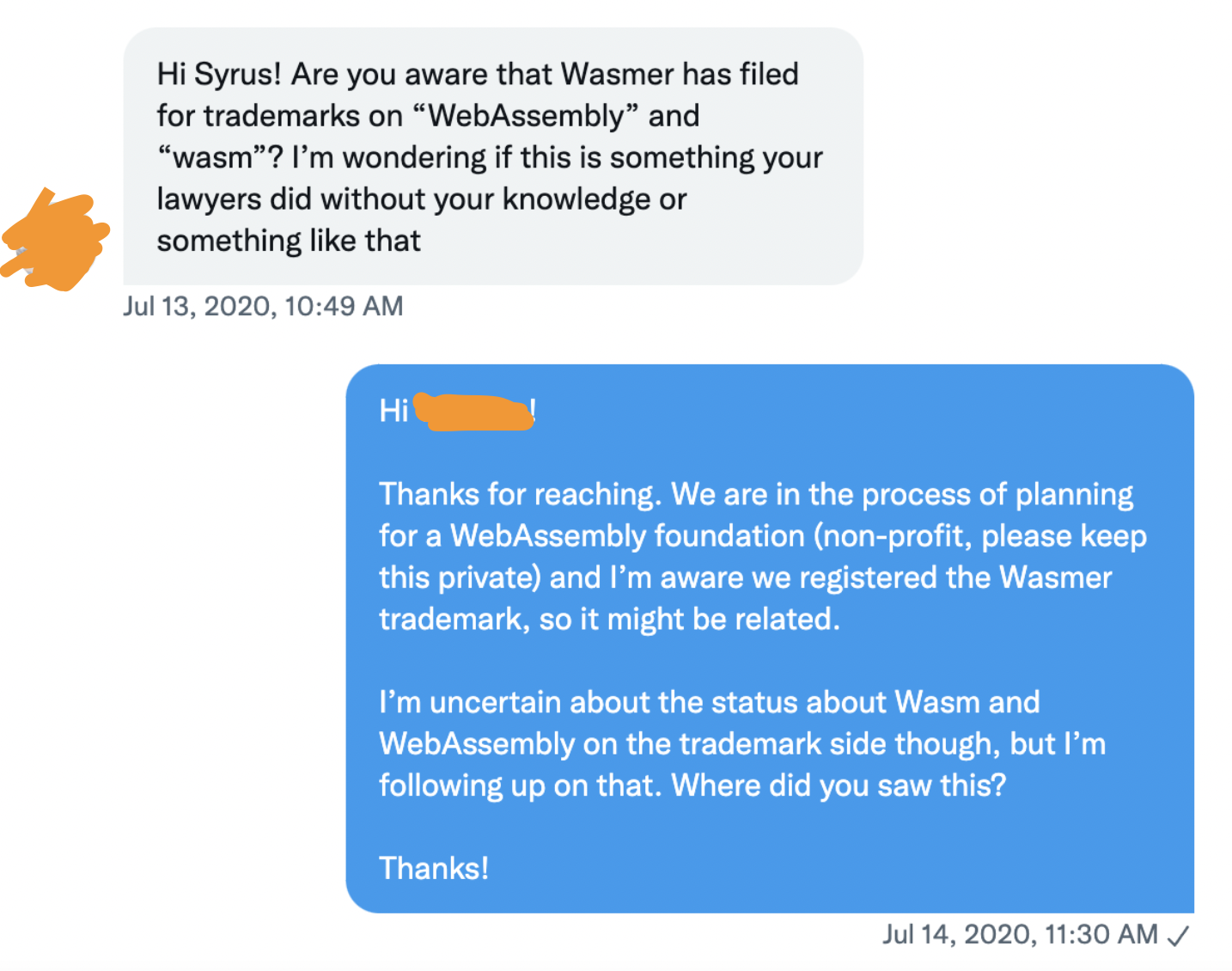I’m Syrus, founder and CEO of Wasmer.
In our latest Hacker News announcement, there were some comments and understandable concerns about the fact we, Wasmer, a VC-backed corporation, attempted to trademark the name of a non-profit organization, specifically WebAssembly. This must appear to be at best an extremely misjudged idea, and at worst a predatory act of corporate aggression. There are only some incomplete clues scattered around the Internet as to what Wasmer’s motivations were, so it is ample time we made a more formal and complete public account.
We intentionally decided to wait some time in order to heal and portray the situation, so that the conversation remains productive for Wasmer and the WebAssembly ecosystem as a whole. We now believe is a good time to share the story.
Let’s start from the beginning. Why apply for any trademark at all?
The Bytecode Alliance
Not only does Wasmer fundamentally rely on the project and success of WebAssembly (Wasm), but it also depends on and is held accountable to the spirit and values of the open-source community that sustains it. Wasmer, by necessity, design, and passion lives and breathes Wasm and open source.
Not long after I created Wasmer in December 2018, a non-profit organization called The Bytecode Alliance came into being that sought to ally, inspire and promote the values and vision of the new software paradigm that Wasm and its associated projects were bringing to the world.
A fact that is sometimes overlooked about Wasm is that it is as much, if not more so, a social achievement, as opposed to a merely technical achievement.
WebAssembly's beauty is that it has consensus buy-in from all the major browser vendors. In the often rocky history of software and its vendors, Wasm’s broad acceptance is a monumental and inspiring success. The Bytecode Alliance walks in some of those footsteps.
So of course we applied to join. But we were unofficially rejected on November 12th 2019 (the date is key if you wish to trace future events) by written communication from one of the Bytecode Alliance's co-chairs to one of Wasmer's investors. And it is this singular event that begins to explain the scattered and incomplete clues of Wasmer’s foray into inappropriate trademarking.
As is dictated by our commitment to open source and the precedent of social alignment set by WebAssembly, here is not the place to air our feelings about that rejection. Suffice to say that if Wasmer cannot be part of The Bytecode Alliance it is a significant reflection on one of, or both, of these organizations. Individual opinions have been publicly shared elsewhere. If you would like more details about our side of events, then we would be more than happy to discuss them privately.
Even if it were not the case that Wasmer is at fault, we still, and forever, share any burdens from the open-source community as a whole. Wasmer unreservedly supports the mission of any foundation or alliance trying to push an ecosystem forward, and of course that includes The Bytecode Alliance.
The WebAssembly Foundation
Whether rightly or wrongly, and without wanting to go into the details of our rejection, I soon started planning to form another WebAssembly Alliance, one that could perhaps help propel other companies and projects with similar visions to ours. I began contacting entities such as the CNCF, amongst others, to discuss creating a non-profit foundation of broader scope, I thought to call it: The WebAssembly Foundation.
I had always intended for the Wasmer runtime to be a part of a shared foundation effort between companies. And had registered the webassembly.foundation domain in 2018, before both Wasmer was even a company and the Bytecode Alliance existed. Also, you can see that the Wasmer runtime repo was redirected from the WAFoundation Github organization at that time: https://web.archive.org/web/20181230031716/https://github.com/wafoundation/wasmer
So, once I had talked to enough supportive entities, I started to contact specialized lawyers to form the foundation. Simply because “WebAssembly” is part of the name “WebAssembly Foundation”, an attempt was made to register a trademark for “WebAssembly”. The intent was not to kidnap the name, nor to aggressively prevent its usage, but solely to create the foundation.
The lawyers eventually began the process of creating the foundation itself and I signed a few papers. But for other reasons, including other company priorities, I decided it was too early to create a foundation, and we decided not to sign the engagement letter with the lawyers. I wrongly assumed the foundation and trademark process had halted.
A few months later, on July 13th, 2020 I received this message on Twitter from a member of the W3C:

As soon as I received that message I contacted the lawyers and realized that:
- The trademark process had progressed despite not signing the agreement with them.
- The United States Patent and Trademark Office (USPTO) refused the initial application requesting more information to pursue the WebAssembly trademark.
All this meant that we were still on the period where we could decide if we wanted to further pursue the trademarks or formally abandon them.
If we had had bad intentions at that moment we could have still pursued the trademark at that time. Instead, we left the process to expire, leading to this official response from USPTO in September of the same year: https://uspto.report/TM/88703780 “Status: Abandoned because the applicant failed to respond”.
Although all these events still do not portray Wasmer in the best light, I hope they can at least assuage the understandable concerns of our community that we had acted in a way so fundamentally contrary to the values of open source and WebAssembly in particular.
End note
Our vision for the future of WebAssembly and Edge Computing remains intact, and whether driven by an alliance of today or a foundation of the future we are very excited about what's coming next.
Technology is just a means to an end, product is always the ultimate value add. And with that vision, we plan to empower developers and enterprises in the future of computing, whether centralized (Cloud Computing), mixed (Edge Computing) or completely decentralized (Web3) their computing is.
We want to hear from you about your projects and ideas for enabling truly universal computing, running safely and quickly on any platform.
Please don't hesitate to get in touch with us at team@wasmer.io
About the Author
Syrus Akbary is an enterpreneur and programmer. Specifically known for his contributions to the field of WebAssembly. He is the Founder and CEO of Wasmer, an innovative company that focuses on creating developer tools and infrastructure for running Wasm
Syrus Akbary
Founder & CEO
The Bytecode Alliance
The WebAssembly Foundation
End note
Deploy your web app in seconds with our managed cloud solution.

